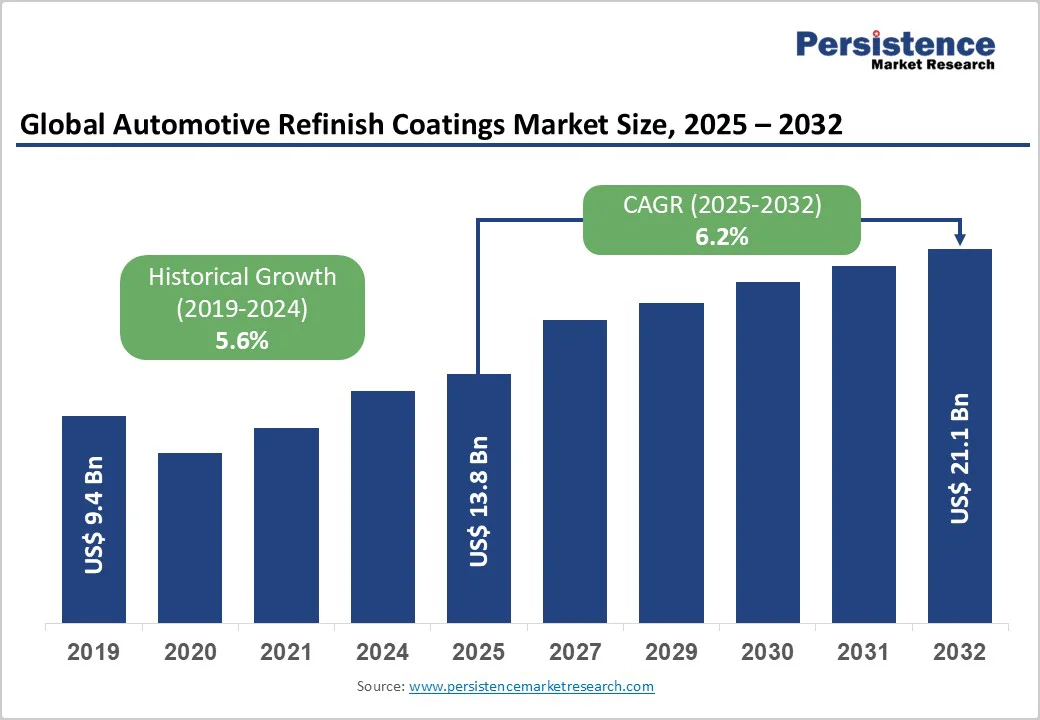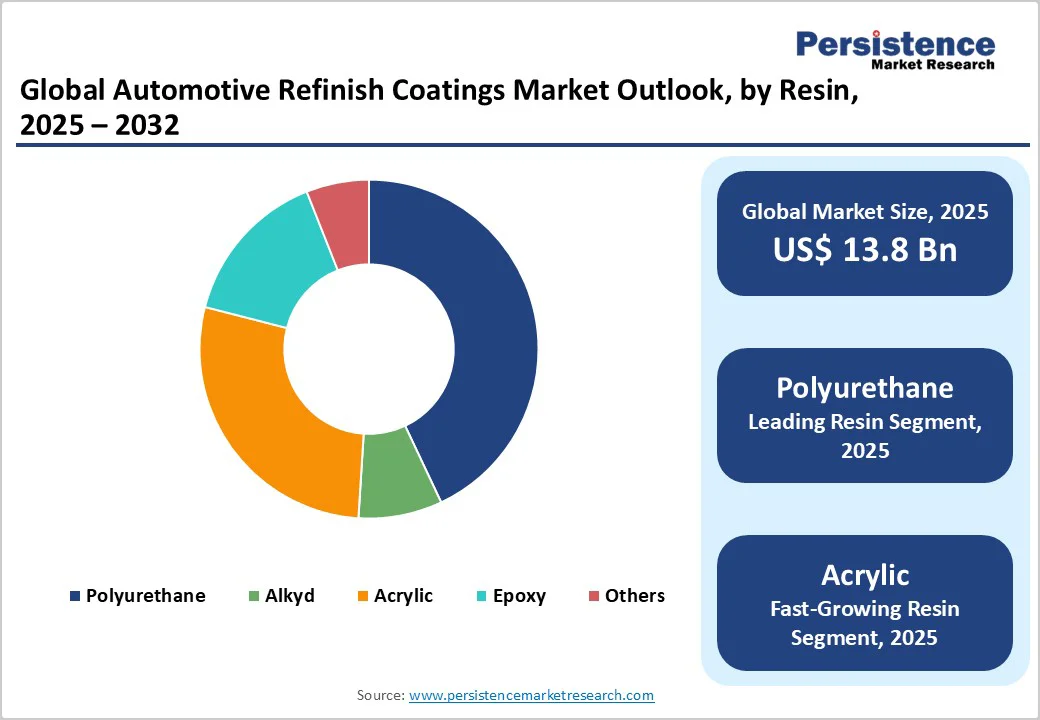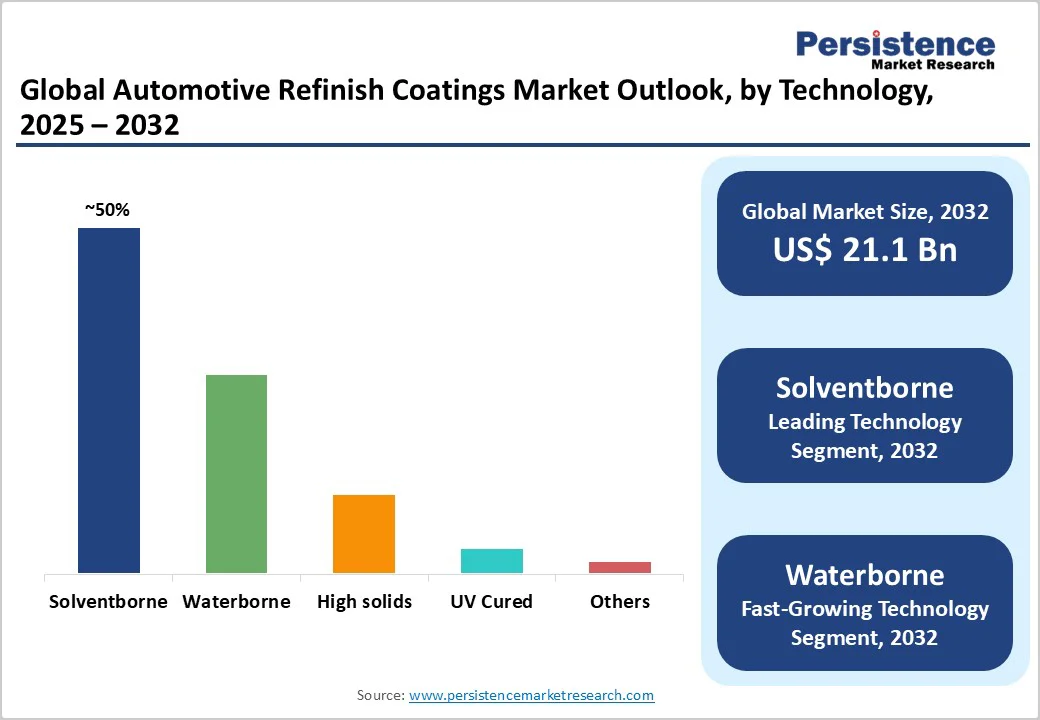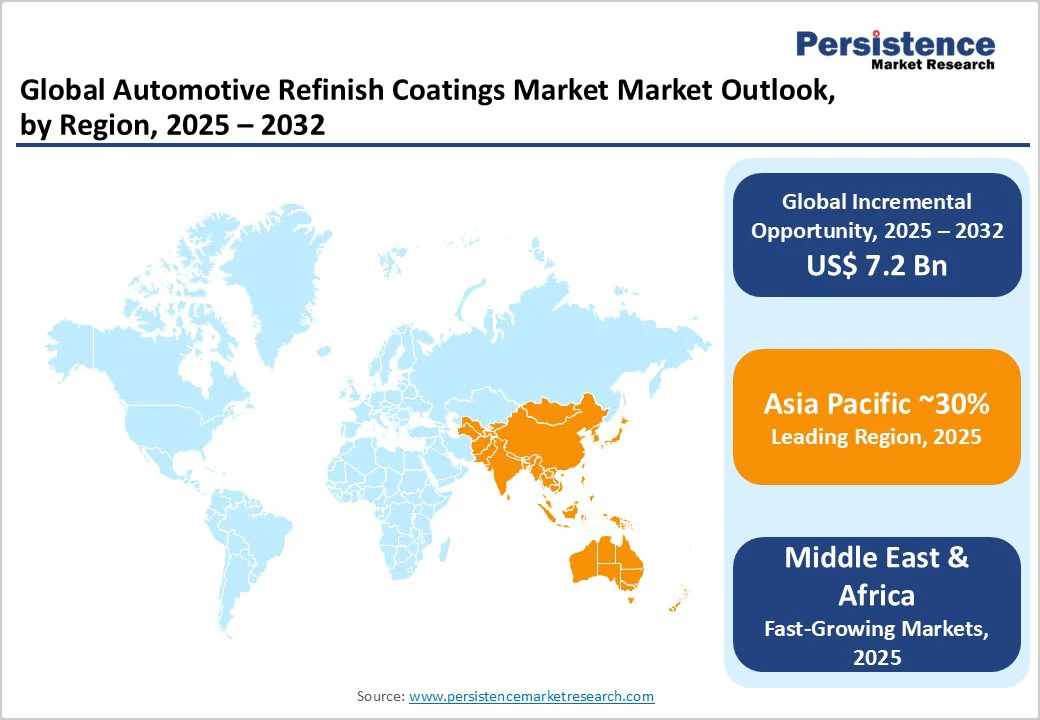ID: PMRREP19336| 179 Pages | 29 Oct 2025 | Format: PDF, Excel, PPT* | Automotive & Transportation

The global automotive refinish coatings market size was valued at US$13.8 billion in 2025 and is projected to reach US$21.1 billion by 2032, growing at a CAGR of 6.2% between 2025 and 2032.
The growing trend toward vehicle customization and aesthetic upgrades, and the rising average age of the vehicle fleet, has created more frequent refinish maintenance.
In addition, the rising rates of vehicle collisions also triggers the need for professional refinishing services.
| Key Insights | Details |
|---|---|
| Global Automotive Refinish Coatings Market Size (2025) | US$13.8 Bn |
| Projected Market Value (2032F) | US$21.1 Bn |
| Global Market Growth Rate (CAGR 2025 to 2032) | 6.2% |
| Historical Market Growth Rate (CAGR 2019 to 2024) | 5.6% |

Global vehicle production rebound is fundamentally driving refinish coating consumption. The global vehicle parc, including passenger vehicles and commercial vehicles, is projected to surpass 2 billion units by 2032, with significant growth concentrated in emerging Asian markets. This vehicle population growth directly correlates with increased collision repair requirement as higher vehicle density leads to elevated accident frequencies requiring professional refinishing services.
Economic recovery in mature markets is reinforcing collision repair volumes, with body shop utilization rates returning to pre-pandemic levels. The used car market expansion further amplifies refinish demand, as consumers increasingly invest in vehicle restoration to maximize resale value. Industry infrastructure development, including automated spray systems and digital color-matching technologies, is enabling higher throughput and improved finish quality, supporting market monetization.
Environmental regulations from local governments are creating structural market shifts, such as California's Air Resources Board restricting industrial-maintenance VOCs to 50 g/L, representing a tenfold tightening against federal thresholds. European Union Green Deal measures and updated REACH restrictions are accelerating waterborne system adoption, with body shops reporting 64% penetration of water-based basecoats, validating commercial viability.
This regulatory environment is driving innovation in coating formulations, with manufacturers developing ultra-low emission blends that maintain adhesion, gloss, and durability performance standards.
Government incentives for sustainable manufacturing practices are providing additional momentum, enabling coating suppliers to justify premium pricing for environmentally compliant technologies while improving operational efficiency through reduced waste and energy consumption.
The increasing average age of the global vehicle fleet is creating sustained demand for refinish services. In the U.S., vehicles 7 years or older represented 46.8% of repairable appraisals in Q1 2025, up from 38.4% in Q1 2020, reflecting consumers' tendency to retain vehicles longer due to economic factors and improved durability.
The demographic shift correlates with higher refinish requirements, as older vehicles experience more frequent paint degradation, corrosion issues, and aesthetic maintenance needs. The trend is particularly pronounced in mature markets where vehicle replacement cycles have extended significantly beyond traditional 3-5-year periods.
Waterborne coatings command premium pricing compared to solvent-based alternatives due to elevated raw material costs, specialized formulation requirements, and substantial R&D investments. The requirement for skilled labor during application and process control increases operational expenses, particularly challenging smaller independent body shops with limited technical expertise and capital resources.
Initial infrastructure investment for waterborne systems includes spray booth modifications, humidity control equipment, and specialized handling systems, creating barriers to adoption for cost-sensitive market segments. Supply chain disruptions affecting raw material availability further compound cost pressures, with volatile pricing for key components, including resins and additives, impacting profitability margins.
Advanced coating technologies, including smart coatings and nano-enhanced formulations, require specialized application techniques and quality control processes. Color-matching precision demands sophisticated spectrophotometer systems and digital mixing capabilities, increasing complexity for smaller repair facilities lacking technical infrastructure.
Performance validation for new coating systems requires extensive testing protocols, extending product development timelines and increasing commercialization costs. Inconsistent application standards across regional markets create challenges for global coating suppliers seeking standardized product portfolios.
Leading paint companies, such as PPG, forecast that the electric vehicle coatings addressable market to be worth more than US$ 2.5 per annum, creating specialized refinish opportunities. EV-specific coating requirements include enhanced thermal management for battery enclosures, electromagnetic interference shielding, and lightweight composite protection systems.
The rapid growth of electric vehicle adoption is generating new opportunities for specialized coating formulations addressing unique EV requirements. Electric vehicles demand enhanced dielectric coatings with >30kV/mm strength for battery protection, anti-corrosion systems for lightweight aluminum construction, and electromagnetic interference (EMI) shielding capabilities.
As of 2025, EVs represent approximately 4% of the global EV fleet in operation, with accelerating adoption rates expected over the next 5-7 years. Coating manufacturers are looking forward to the opportunity, to develop tailored solutions for battery enclosures, thermal management systems, and high-voltage component protection.
Development of self-healing coatings and color-shifting technologies presents premium market opportunities, particularly in luxury vehicle segments. Digital integration, including IoT-enabled quality monitoring and automated application systems, is creating efficiency improvements and differentiation possibilities.
Nanotechnology integration in coating formulations is enabling enhanced scratch resistance, improved weather protection, and extended gloss retention, justifying premium pricing while reducing maintenance intervals. Advanced application equipment, including robotic systems and precision spray technologies, is enabling higher quality consistency and throughput optimization.
Polyurethane resins maintain the leading market position with over 40% market share, valued at over US$5 billion in 2025. This dominance stems from polyurethane's superior performance characteristics, including exceptional flexibility, chemical resistance, and adhesion properties across diverse substrate materials. The segment benefits from extensive usage in both basecoat and clearcoat applications, particularly in premium automotive segments where durability and aesthetic quality are paramount.
Acrylic resins represent the fastest-growing segment, primarily driven by waterborne acrylic formulations that align with stringent environmental regulations. These systems offer superior color clarity and weather resistance while maintaining low solvent content, making them preferred choices for eco-conscious manufacturers and regulatory compliance.
Progress in acrylic resin technology has enhanced performance characteristics and application flexibility, broadening potential applications within automotive refinish operations. Acrylic coatings offer excellent weathering resistance and color stability, making them particularly suitable for vehicles requiring long-term aesthetic retention.

The basecoat segment commands the largest market share with over 40% of total market value in 2025, driven by its critical role in defining vehicle aesthetics and providing vibrant color effects. Basecoats are essential for achieving metallic, pearlescent, and specialty color finishes that consumers highly value for personalization and customization.
Technological advancements in basecoat formulations have achieved improved color fastness, enhanced coverage capabilities, and faster drying times, enabling more efficient application processes and reduced operational costs for refinish operators. The segment benefits from expanding aftermarket personalization demand and increasing vehicle ownership in emerging regions.
Clearcoat represents the fastest-growing coating layer segment, reflecting increased demand for enhanced surface protection and gloss enhancement. Modern clearcoat systems incorporate advanced UV protection, scratch resistance, and self-healing capabilities that extend coating lifespan and reduce maintenance requirements.
Solventborne technology maintains the leading market position with 50% market share in 2025, supported by extensive existing application infrastructure and established performance characteristics. Despite environmental pressures, solventborne systems continue to dominate in applications requiring specific performance attributes, including extreme durability and chemical resistance.
Solventborne coatings offer rapid drying characteristics and efficient application properties, enabling body shops to achieve desired finishes with predictable processing times. These systems deliver high-quality finishes with excellent gloss, color richness, and aesthetic appeal critical for automotive applications.
Waterborne coatings represent the fastest-growing technology segment, driven by environmental compliance requirements and superior application characteristics. These systems offer reduced VOC emissions, faster drying times, and enhanced color accuracy while providing comparable or superior performance to traditional solvent-based alternatives.

The North American automotive refinish coatings market size is predicted to reach US$5 billion by 2032, representing a mature market with established regulatory frameworks and innovation ecosystems. The region benefits from advanced ADAS technology adoption, creating premium pricing opportunities for specialized calibration and repair services.
The U.S. automotive refinish coatings market is valued at US$3.3 billion in 2025, and is projected to reach US$4.6 billion by 2032, accounting for over 1/5th of the global demand. The market is primarily driven by high vehicle ownership rates, extensive collision repair infrastructure, and strong insurance industry support for quality refinish work.
Innovation ecosystem advantages include concentrated R&D capabilities, early adoption of digital color-matching technologies, and automated application systems enabling productivity improvements. Investment trends favor sustainability initiatives and advanced coating technologies, with manufacturers establishing regional production capabilities to serve local demand while meeting regulatory requirements.
The European automotive refinish coatings market size is valued at US$2.9 billion in 2025, with Germany, France, and the U.K. leading the regional demand. The European market is characterized by stringent environmental regulations under the VOC Paints Directive, driving accelerated adoption of low-emission coating systems.
Germany's automotive refinish coatings market is expected to surpass US$600 million by 2032. The country’s automobile engineering leadership and higher road speed limits contribute to increased collision frequency and repair complexity, supporting premium coating demand.
Regulatory harmonization across European Union member states is accelerating waterborne coating adoption, with stringent VOC emission standards creating competitive advantages for environmentally compliant technologies. The region's focus on sustainability and circular economy principles is driving innovation in bio-based resins and recyclable coating systems.
Asia Pacific leads the demand for the automotive refinish coatings market. The region controls over 30% of global consumption in 2025, with China serving as the largest contributor. The region benefits from rapid vehicle ownership expansion, urbanization trends, and significant investments in automotive manufacturing infrastructure.
China's market dominance reflects its position as the world's largest automotive manufacturer, producing millions of vehicles annually, requiring multi-layer paint systems for protection and aesthetic enhancement. The country's electric vehicle expansion is driving demand for specialty coatings protecting battery enclosures and improving thermal management efficiency.
India automotive refinish coatings market is valued at over US$250 million in 2025 and is projected to exhibit the fastest growth at 8.5% CAGR between 2025 and 2032. India's emergence as the fastest-growing regional market is supported by rising disposable incomes, an expanding middle-class population, and increasing vehicle purchases in metropolitan areas. Government initiatives, including production-linked incentives and automotive mission plans, are enhancing India's potential as an essential hub for coating manufacturers.
Manufacturing advantages in the region include cost-competitive production capabilities, expanding technical expertise, and growing infrastructure supporting organized body shop networks. Regional investment trends favor capacity expansion by global coating suppliers establishing local production facilities to serve domestic demand while capturing export opportunities.

The global automotive refinish coatings market exhibits moderate consolidation with the top five players controlling approximately 50-55% of the total global market share. Axalta Coating Systems leads the global automotive refinish coatings market, followed by PPG Industries and BASF SE as major competitors.
The market structure enables both global scale economies and regional specialization opportunities, with local manufacturers serving specific geographic markets through cost-competitive offerings and customized solutions. Major industry players are accelerating investments in sustainable coating technologies, with Arkema showcasing Synaqua® bio-based waterborne resins containing up to 97% renewable content at Paint India 2024, demonstrating industry commitment to environmental performance.
The global automotive refinish coatings market size is expected to value at US$13.8 billion in 2025.
Increase in vehicle collision rates require professional refinishing services, the growing trend toward vehicle customization, aesthetic upgrades encourages the need for automotive refinish solutions.
The Global Automotive Refinish Coatings Market is poised to witness a CAGR of 6.2% between 2025 and 2032.
Electric Vehicle Expansion Creating Specialized Coating Demands.
Some key players include Axalta Coating Systems, LLC, PPG Industries Inc., BASF SE, AkzoNobel N.V., and The Sherwin-Williams Company.
| Report Attribute | Details |
|---|---|
| Historical Data/Actuals | 2019 - 2024 |
| Forecast Period | 2025 - 2032 |
| Market Analysis | Value: US$ Bn |
| Geographical Coverage |
|
| Segmental Coverage |
|
| Competitive Analysis |
|
| Report Highlights |
|
By Resin
By Coating Layer
By Technology
By Vehicle
By Region
Delivery Timelines
For more information on this report and its delivery timelines please get in touch with our sales team.
About Author